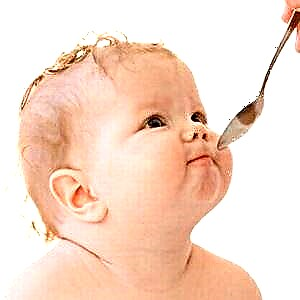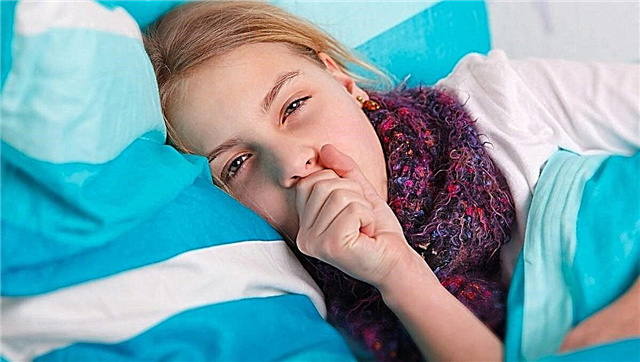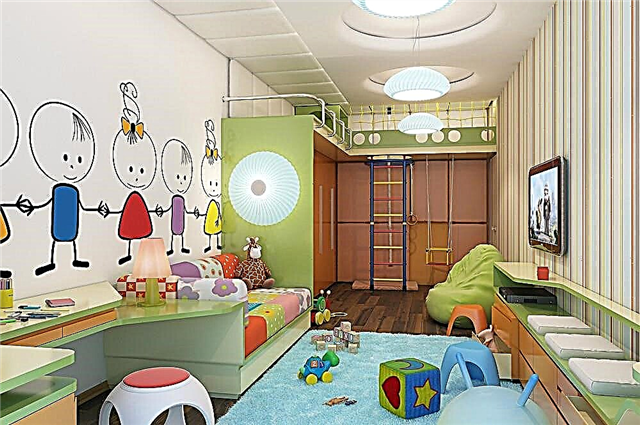A strong cough in a child speaks of very different conditions of the body. Sometimes it is difficult to decide, you should consult a doctor for advice today, make an appointment in the near future, or rush to the hospital's emergency room this very minute.
While a cough may seem dire, it is usually not a sign of a serious condition. A cough is a technique the body uses to keep the airways clear, rid the nasal cavity of mucus, or mucus from the throat. It is also a method of protection if a piece of food or other foreign body gets stuck.
Child's cough
There are two types of coughs in total - productive (wet) and unproductive (dry).
Babies under 4 months of age do not cough much. Therefore, if a newborn coughs, it is serious. If a child is coughing just scared, this may be a manifestation of respiratory syncytial virus infection.
This infection is extremely dangerous for babies. When a child is over 1 year old, coughing becomes less of a cause for anxiety. And often it is nothing more than a cold.
But sometimes a strong cough in a child is a reason for a visit to the doctor. Understanding what the different types of cough mean can help you know when to see your doctor and how to treat a baby's cough.
Wet (productive) cough in an infant
Its main cause is inflammation and mucus secretion in the upper respiratory tract. At night, a cough occurs because mucus runs down the back of the throat. A productive cough also removes phlegm from the lungs with pneumonia or bronchitis.
Features:
A wet cough is an effective way to rid your child's body of unnecessary fluids in the respiratory system. When an infant's cough is the result of a bacterial infection, the secreted mucus and phlegm will contain bacteria that the pediatrician can detect with flora culture.
Older children may spit out phlegm. Younger children tend to swallow it. As a result, babies with a wet cough can also develop an upset stomach. The upside is that whatever is swallowed will eventually leave the body through stool or vomit.
Dry and raspy cough
A dry cough is a cough that does not produce mucus or phlegm. The cough reflex is provoked by irritation of the respiratory tract mucosa.
Besides removing irritants, coughing also removes mucus. If mucus is produced in negligible amounts, this, accordingly, leads to the development of a dry cough.
If there is little sputum, the cough will be unproductive.
Even if the cough is dry, mucus and phlegm are still present in the lungs or airways. Most likely, their number is so small that it cannot cough up when coughing.
Typically, a cough can start off as a non-productive (dry cough). Over time, it develops into a productive (wet) cough.
Aside from certain infections, any respiratory irritation from allergies, air pollution, cigarette smoking, and exposure to certain medications can lead to dry coughs.
Causes of cough in a child
Colds and upper respiratory tract infections
Inflammation in the upper respiratory tract is almost always accompanied by dry coughing. However, if the infection spreads lower to the bronchi and lungs, or mucus leaks, an unproductive cough may become productive.
 Prolonged dry coughing is also observed after a previous respiratory tract infection.
Prolonged dry coughing is also observed after a previous respiratory tract infection.
False croup with stenosing laryngotracheitis
The hallmark of croup is a deep cough that sounds like barking and worsens at night. The baby's voice will hoarse. The patient's breathing during sleep is accompanied by a high-pitched and hissing (stridor) sound.
This condition requires immediate medical attention.
Allergies and bronchial asthma
Parents of a child who is allergic to cat hair, dust, or other elements of their environment may feel like it's a cold that will never go away.
Allergies can cause nasal congestion or runny nose with clear mucus, as well as coughing due to constant flow of mucus. Children with asthma also cough frequently, especially at night.
When a child has asthma, he has bouts of wheezing. The impact of cold on a patient with bronchial asthma can also cause coughing.
If your toddler starts coughing after running (exercise-induced asthma), this is another symptom in favor of asthma as a cause of coughing.

Pneumonia or bronchitis
Many cases of pneumonia, infections in the lungs begin as a cold. If a child has a cold that worsens - a persistent cough, shortness of breath, fever, body aches, chills - call a doctor. Bacterial pneumonia often causes a wet cough, viral pneumonia - a dry one.
Bronchitis occurs when the structures that carry air to the lungs become inflamed. This often happens in the background or after a cold and flu. Bronchitis causes a persistent cough for several weeks.
When a child has bacterial pneumonia or bronchitis, he or she will need an antibiotic to treat the infection and cough.
Sinusitis - inflammation of the paranasal sinuses
When a child has a cough, a runny nose that lasts more than ten days with no signs of improvement, and your doctor has ruled out pneumonia and bronchitis, the baby may have sinusitis.
 A bacterial infection is a common cause of dry coughs. However, excessive fluid draining into the airways, coupled with a rare cough in a newborn, can lead to a productive cough as mucus builds up there.
A bacterial infection is a common cause of dry coughs. However, excessive fluid draining into the airways, coupled with a rare cough in a newborn, can lead to a productive cough as mucus builds up there.
If the doctor determines that the child has sinusitis, they will prescribe an antibiotic. The cough should stop after the sinuses are clear again.
Foreign bodies in the airways
A cough that lasts two weeks or more without other signs of illness (eg, runny nose, fever, lethargy) or allergies is often an indication that a foreign object is stuck in the child.
It gets into the throat or lungs. This situation is more common among young children who are very mobile, have access to small objects and like to drag everything into their mouths.
In most cases, the child immediately shows that he has inhaled some object - the baby will begin to choke. At this moment, it is vitally important for parents not to get confused and provide first aid.
Whooping cough
May cause convulsive cough. A child with whooping cough usually coughs non-stop for 20 to 30 seconds and then struggles to catch his breath before the next coughing fit begins.
Symptoms of a cold, such as sneezing, runny nose, and mild coughing, can be felt as early as two weeks before more severe coughing attacks begin.
In this situation, call your doctor immediately. Whooping cough can be severe, especially in children under 1 year of age.
Read a detailed article by your pediatrician about the causes, symptoms, and treatments for conditions like whooping cough in children.
Cystic fibrosis
Cystic fibrosis affects about 1 in 3000 children, and a persistent cough with thick yellow or green mucus is one of the most obvious signs that a child may have inherited the disease.
Other signs include recurrent infections (pneumonia and sinusitis), poor weight gain, and a bluish skin tone.
Environmental irritants
Environmental gases such as cigarette smoke, combustion products and industrial emissions irritate the respiratory tract and cause the child to cough. It is necessary to immediately determine the cause and, if possible, eliminate it.
Visit to the doctor

Seek medical attention if:
- the child has trouble breathing or is straining to breathe
- rapid breathing;
- bluish or darkish color of the nasolabial triangle, lips and tongue;
- heat. You should be especially attentive to her when there is a cough, but there is no runny nose or nasal congestion;
- have a fever and cough in a baby under three months old;
- an infant under three months of age has a wheezing breath for several hours after a coughing fit;
- when coughing, sputum leaves with blood;
- wheezing on exhalation heard from a distance;
- the baby is weak, moody or irritable;
- the child has a concomitant chronic illness (heart or lung disease);
- dehydration.
Signs of dehydration include:
- dizziness;
- drowsiness;
- little or no saliva;
- dry lips;
- sunken eyes;
- crying with little or no tears;
- rare urination.
Cough examination
Generally, children with cough do not need extensive additional research.
Usually, the doctor, after carefully examining the medical history and other symptoms, can already find out what is the cause of the cough when examining the child.
Auscultation is one of the best methods for diagnosing the causes of cough. Knowing what a cough sounds like will help the doctor decide how to treat the child.
The doctor may send a chest x-ray if the child suspects pneumonia or to rule out a foreign body in the lungs.
A blood test will help determine if a serious infection is present.
Depending on the cause, the doctor will tell you how to treat a cough in a baby.
How is a cough treated?
Since a wet cough has an important function in children - helping their airways to remove unnecessary substances, parents should try to help such a cough achieve its goal.

How to remove phlegm in a baby?
- to do this, you need to make sure that the child drinks a lot of liquid, which will not irritate his throat even more. For example, apple juice or warm broth. You can also give your child over 2 years old honey as a natural cough medicine. Naturally, in the absence of allergies to it.
However, if your baby's condition worsens or has a wet cough for more than two weeks, you should consult a healthcare professional to review treatment;
- if the development of a cough is provoked by an allergen, the doctor prescribes antihistamines. If the cause is a bacterial infection, antibiotics;
- If your child's doctor suspects a foreign body is causing a cough, he or she will send a chest x-ray. If a foreign object is found in the lungs, the object must be removed surgically;
- if the patient's condition worsens, it may be necessary to use a bronchodilator through a nebulizer (a more advanced version of an inhaler). This will make it easier for the patient to breathe by expanding the bronchioles.
Treatment of cough in newborns is carried out only under the supervision of a pediatrician.
How to cure a cough in a baby at home?
Treatment of a cough in a baby at home involves several actions:
 If your child has asthma, you must have a treatment plan developed by your doctor. It includes basic therapy, which is ongoing, and drugs in case of an attack.
If your child has asthma, you must have a treatment plan developed by your doctor. It includes basic therapy, which is ongoing, and drugs in case of an attack.- For a barking, “croupy” cough, turn on hot water and let the steam fill the entire bathroom space. Stay there with your child for 20 minutes. The steam will help your baby breathe easier.
- Sometimes, short-term exposure to cold air can help relieve coughing. Make sure to dress your child for the weather.
- Do not give a child, especially a newborn or toddler, cough medicine without first consulting a doctor.
- Keep your baby's head elevated while sleeping to reduce coughing at night. A quick and effective way to do this is to put a pillow under the mattress on the side of the head that will slightly lift the child, will not move and knock out during the night.
- A humidifier in the room will prevent the baby's mucous membranes from drying out and causing an irritating cough.
Infant fever with cough
Some illnesses and coughs in infants are accompanied by mild fever (up to 38° C).
In these cases, follow these steps:
- Children under 1 month. Call your pediatrician. Fever is not normal.
- Infant up to 3 months. See your doctor for advice.
- Infants 3 - 6 months old. Give Paracetamol or Ibuprofen. If necessary, every 4 - 6 hours. Follow the dosage directions carefully and use the syringe that came with the medicine, not the homemade spoon.
- Infants 6 months and older. Use Paracetamol or Ibuprofen to lower the temperature.
Do not give both drugs at the same age at the same time. It can cause accidental overdose.
Thus, if the parents know why the child is coughing and how to treat a severe cough, various unpleasant consequences of this symptom can be avoided.

 If your child has asthma, you must have a treatment plan developed by your doctor. It includes basic therapy, which is ongoing, and drugs in case of an attack.
If your child has asthma, you must have a treatment plan developed by your doctor. It includes basic therapy, which is ongoing, and drugs in case of an attack.

